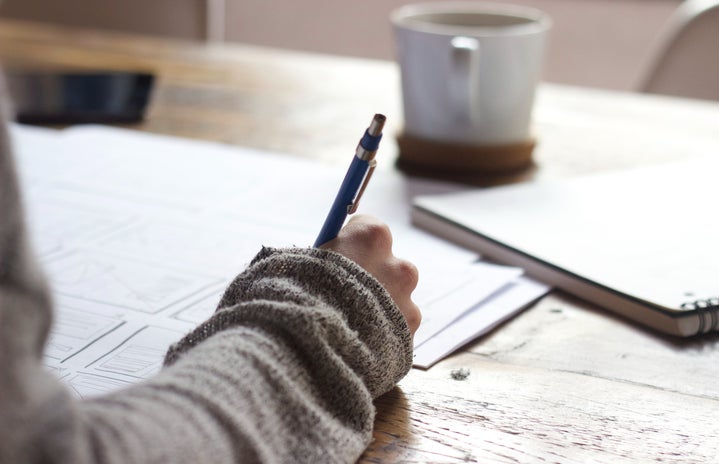There comes a time in most people’s lives when they have to go to others for help. Sometimes people turn to their families, friends or religious organizations. However, a lot of people also turn to social workers for support, as well as services. Enter Alicia Armstrong. She has her MSW (Master of Social Work) and is an RCSWI (Registered Clinical Social Worker Intern). We sat down with her to learn a little more about her and get an inside look at what she does as a social worker.
Her Campus (HC): What is it you do in your profession?
Alicia Armstrong (AA): I provide therapy services to individuals, I also run an LGBT+ monthly support group for my profession and I am a social work educator and sex educator.
HC: What led you to want to join a helping profession and to do all of this?
AA: A lot of people that go into helping professions, especially social work, have overcome things in their past and their childhoods that make them want to join the helping profession. That is the same for me, I had childhood trauma that I am in recovery from, and the people who supported me in my journey towards being whole and complete really made a huge impact on my life, and I wanted to be able to give back to others in the way that they gave to me.
HC: What is something you’d like people to know or what ways would you like to change what people think about your profession?
AA: So, there are stereotypes associated with the social work profession, but I kind of want to talk about therapist stereotypes a little bit. Something that I have seen and heard from people that I know personally is that there is a misconception that therapists have perfect lives and have everything figured out, and that’s not true. We have struggles and challenges just like everybody else, so I think the thing I want to say about therapists is that we’re people first. We have our own unique challenges, our lives aren’t perfect, but we’re able to use our skills and training to help others sort out their lives and be better versions of themselves.
HC: What is your favorite thing about what you do, and why?
AA: I really like working with so many different types of people and personalities, both in therapy and in teaching. I’ve found that something that’s been incredible for me to witness is the power of humanity, the power of listening, the power of empathy and pairing that with therapeutic skills, and how you can really help somebody change their own life by using that.
HC: So, keeping that in mind, do you have a favorite or most meaningful moment of your career?
AA: I do, actually. In 2017, I was given the award of the Refuge House Volunteer of the Year. Refuge House serves the Big Bend area in Tallahassee as a domestic violence and sexual assault center. So, they have a hotline, they have an emergency shelter, they have transitional housing, they have therapy services and group counseling and sexual assault crisis counseling that they do. I was fortunate enough to work with them on a volunteer basis before I was a paid employee for a short time. One of the things that was important to me with my past as being a domestic violence and sexual assault survivor was the overlap between animal abuse and domestic violence and sexual assault.
AA: One thing for me leaving my abusive situation was to plan and really think about my pets, my dog specifically. Other domestic violence shelters had an environment where you could bring your pet with you, and have it be safe from the hands of your abuser as well. So it helps prevent things like retaliation and other forms of control through animal abuse after somebody leaves their abusive situation. But we didn’t have that in Tallahassee, and it was something that Refuge House shared with me that they’d been talking about and trying to find funding for and finding a way to make a kennel happen, for years and years, but it just never came to be.
AA: So, in probably 2014, I started talking to the executive director of Refuge House, who was Meg Baldwin at the time, and we would have discussions and every time I would see her at a Refuge House charity event I would talk about the kennel that I would love to see happen. I knew that I couldn’t financially make that happen, but it was something that I kept fresh in the forefront of her mind. Sure enough, she got a group together and we were able to all participate in different ways about opening the kennel. So there were four dog kennels there and a cat room, so it was really cool and I got to experience going to the opening of that and being interviewed by different local news channels with the executive director at the time, and I brought my dog who was the inspiration for it with me. So that was really cool to see that just having that conversation—I wasn’t the one who got the grant funding and did the building or anything like that, but I was just involved in the conversation—and how that came to offer a wonderful service in Tallahassee. So, volunteer of the year and that is all kind of meshed together.
HC: What advice would you give to someone interested in social work?
AA: The advice I would probably give to someone going into the social work field has to do with self-awareness, and self-healing. As I mentioned, a lot of people who go into this field have had childhood trauma of some sort. Sometimes we think that we’re healed from something, but we’re not, and we don’t find that out until we’re out there working in the field. So, take advantage of free campus resources like counseling centers or private practice therapists if you have health insurance. Find one that you like and connect with them, build some rapport and have somebody to help you reconcile things that happened in the past. Starting your healing process or solidifying your healing process helps with growth in a different way. So, my advice is to find a therapist and stay in therapy all throughout the time that you’re in school, because that will help you be a better social worker in the future. Once you’re healed or on your way to healing, you’re better equipped to help somebody else.
Want to see more HCFSU? Be sure to like us on Facebook and follow us on Instagram, Twitter, TikTok, YouTube and Pinterest!

